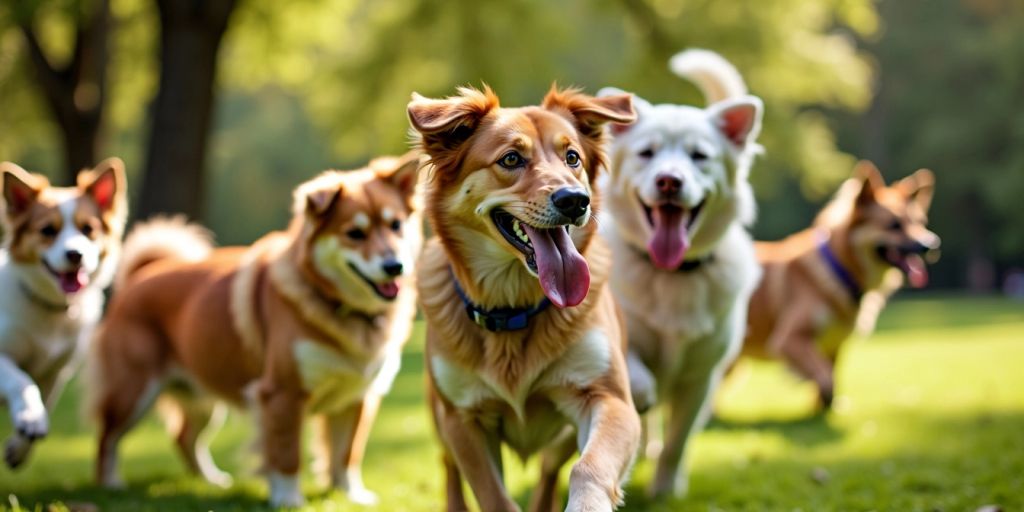Socializing your dog is key to their happiness and well-being. It helps them feel more comfortable in different situations, whether they're meeting new dogs or people. This guide will provide you with tips and tricks to make the socialization process easier and more effective for your furry friend.
Key Takeaways
- Start socialization in safe and controlled environments before gradually increasing exposure.
- Recognize and respond to signs of overwhelm and anxiety in your dog to ensure a positive experience.
- Organize playdates and use dog parks to help your dog interact with other dogs safely.
- Introduce your dog to different people to build positive associations and reduce fear.
- Use training games to make socialization fun and rewarding for your dog.
Understanding the Importance of Dog Socialization
Why Socialization Matters for Your Dog's Well-being
Socialization is more than just meeting other dogs and people. It includes exposing your dog to various environments, sights, sounds, and experiences. Proper socialization helps your dog become more confident and less fearful of new situations. This can prevent behavior problems like aggression and anxiety later in life.
The Benefits of a Well-Socialized Dog
A well-socialized dog is generally happier and more adaptable. Here are some benefits:
- Confidence: Dogs that are used to different environments are less likely to be scared or anxious.
- Better Behavior: Socialized dogs are less likely to develop bad habits like excessive barking or destructive chewing.
- Enjoyable Outings: You can take your dog to more places, like parks and cafes, without worrying about their behavior.
Common Misconceptions About Dog Socialization
There are several myths about socializing dogs:
- Myth: Only puppies need socialization.
- Fact: Dogs of all ages benefit from socialization.
- Myth: Socialization is just about meeting other dogs.
- Fact: It also includes exposure to different environments, people, and experiences.
- Myth: Socialization can only happen in the first few months of life.
- Fact: While early socialization is crucial, older dogs can also learn to enjoy new experiences with patience and positive reinforcement.
Socializing your dog is a lifelong process that enriches their life and strengthens your bond with them. Start early and keep it up to ensure a happy, well-adjusted pet.
Introducing Your Dog to New Experiences
Starting with Safe and Controlled Environments
When you first start socializing your dog, it's important to begin in safe and controlled environments. This helps your dog feel secure and reduces the chances of overwhelming them. Start with familiar places like your backyard or a quiet park. Gradually, you can introduce new settings as your dog becomes more comfortable.
Gradually Increasing Exposure
Once your dog is comfortable in controlled environments, you can gradually increase their exposure to new experiences. Take baby steps and introduce one new element at a time. For example, if your dog is used to your backyard, try taking them to a friend's house or a different park. The key is to move at your dog's pace and ensure each new experience is positive.
Recognizing Signs of Overwhelm and Anxiety
It's crucial to recognize when your dog is feeling overwhelmed or anxious. Signs of anxiety can include excessive panting, whining, or trying to escape the situation. If you notice these signs, it's best to remove your dog from the situation and try again another time. Remember, the goal is to build your dog's confidence and adaptability, not to push them too hard.
Socializing with Other Dogs
Organizing Playdates and Meetups
Introducing your dog to other dogs can be a fun and rewarding experience. Start by arranging playdates with dogs that are known to be friendly and well-socialized. A great way to do this is through a familiar activity: walking. Meet up with a friend and their dog for a nice, relaxed walk. Allow plenty of space between the two dogs. If your dog remains calm and polite, reward them with a treat! When the walk is over and both dogs seem relaxed, allow them to sniff each other with their leashes still on. Reward positive interactions with a treat!
Navigating Dog Parks Safely
Dog parks can be a fantastic place for your dog to meet new friends, but they can also be overwhelming. Start by visiting the park during off-peak hours when it's less crowded. Keep your dog on a leash initially and observe the other dogs' behavior. If your dog seems comfortable, you can gradually allow them more freedom. Always be ready to step in if things get too intense. Remember, the goal is to create positive experiences for your dog.
Understanding Canine Body Language
Understanding your dog's body language is crucial for successful socialization. Look for signs of playfulness, such as wagging tails and relaxed postures. Conversely, be aware of signs of stress or aggression, like growling, stiff bodies, or raised hackles. Recognizing these signals can help you intervene before any negative interactions occur. Patience and observation are key to ensuring your dog has positive social experiences.
Socializing with People
Introducing Your Dog to Friends and Family
Start by introducing your dog to friends and family in a calm and controlled environment. This helps your dog feel safe and secure. Encourage your guests to offer treats and speak softly to your dog. Positive interactions will help your dog build trust and feel more comfortable around new people.
Handling Interactions with Strangers
When meeting strangers, it's important to stay calm and confident. Your dog will pick up on your energy. Allow your dog to approach new people at their own pace. If your dog shows signs of anxiety, give them some space and try again later. Remember, patience is key.
Building Positive Associations with New People
Create positive associations by rewarding your dog with treats and praise when they interact well with new people. This reinforces good behavior and helps your dog feel more at ease. Over time, your dog will learn that meeting new people is a positive experience.
Socializing your dog with people is essential for their well-being and helps them become a well-rounded and happy pet.
Using Training Games to Enhance Social Skills
Training games are a fantastic way to boost your dog's social skills while having fun together. These activities not only teach your dog how to behave but also strengthen your bond. Incorporating games into training sessions can make learning enjoyable for both you and your pet.
Managing and Preventing Behavioral Issues
Addressing Aggression and Fear
Aggression and fear in dogs can be challenging, but with the right approach, you can help your pet feel more secure. Early socialization and positive reinforcement are key strategies. If your dog shows signs of aggression, consider supervised playdates and leash training. Understanding the root causes of aggression is crucial for fostering a peaceful relationship between you and your dog.
Curbing Excessive Barking
Excessive barking is not just annoying; it can also indicate stress or anxiety in your dog. To tackle this, identify the triggers causing the barking. Use positive reinforcement to reward quiet behavior and create a calmer environment. Sometimes, professional help or a structured course can provide the tools you need to manage this issue effectively.
Helping Your Dog Cope with Separation Anxiety
Separation anxiety is common but manageable. Start by leaving your dog alone for short periods and gradually increase the time. Provide toys or treats to keep them occupied. In severe cases, consult a veterinarian or a behaviorist for additional support. Remember, a stress-free dog is a happier dog.
Maintaining Social Skills Throughout Your Dog's Life
Continuing Socialization as Your Dog Ages
Socialization isn't just for puppies; it's a lifelong journey. As your dog ages, it's important to keep introducing them to new experiences. This helps them stay adaptable and confident. Older dogs can still learn and enjoy new things, so don't hesitate to take them to new places or introduce them to new friends.
Adapting Socialization Techniques for Senior Dogs
Senior dogs might have some limitations, but that doesn't mean they can't be socialized. Take into account their age and condition. For example, if your dog has mobility issues, choose activities that are less physically demanding. The key is to keep the experiences positive and stress-free.
Ensuring Ongoing Positive Experiences
To maintain your dog's social skills, make sure they continue to have positive interactions. This could be through regular playdates, visits to the dog park, or even just meeting new people on walks. Positive reinforcement is crucial here; reward your dog for good behavior to encourage them to keep it up.
Remember, socialization is a lifelong, ongoing process. Keeping your dog engaged and confident will lead to a happier, well-adjusted pet.
Conclusion
Socializing your dog is one of the best things you can do for their happiness and well-being. By taking the time to introduce them to new experiences, people, and other dogs, you're setting them up for a life full of joy and confidence. Remember, every dog is different, so be patient and go at their pace. Whether you have a playful puppy or a more reserved older dog, socialization can make a world of difference. So get out there, have fun, and watch your furry friend thrive!
Frequently Asked Questions
Why is socializing my dog important?
Socializing your dog is crucial because it helps them become more confident and less anxious in new situations. Well-socialized dogs are generally happier, healthier, and better behaved.
At what age should I start socializing my puppy?
You should start socializing your puppy as early as 3 to 12 weeks old. This is a critical period for them to learn and adapt to new experiences, people, and environments.
Can older dogs be socialized?
Yes, older dogs can be socialized, although it may take more time and patience. With positive reinforcement and gradual exposure to new experiences, older dogs can learn to be more comfortable and confident.
What are some signs that my dog is overwhelmed or anxious?
Signs of overwhelm or anxiety in dogs include excessive panting, drooling, hiding, shaking, or trying to escape. It’s important to recognize these signs and give your dog a break if they seem stressed.
How can I safely introduce my dog to new dogs?
Introduce your dog to new dogs in a controlled environment, like a neutral outdoor space. Keep both dogs on a leash and allow them to sniff each other from a distance before gradually letting them interact more closely.
What should I do if my dog shows aggression towards other dogs or people?
If your dog shows aggression, it's important to address it calmly and seek help from a professional trainer or behaviorist. Avoid situations that trigger aggression and work on building positive associations through controlled exposure and rewards.


